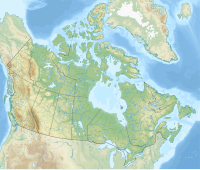Mount James Walker is a 3,035-metre (9,957-foot) mountain summit located in Kananaskis Country in the Canadian Rockies of Alberta, Canada. Mount James Walker is situated within Spray Valley Provincial Park, and its nearest higher peak is Mount Galatea, 5.0 km (3.1 mi) to the northwest.[1]
| Mount James Walker | |
|---|---|
 Mount James Walker seen from the north | |
| Highest point | |
| Elevation | 3,035 m (9,957 ft)[1] |
| Prominence | 322 m (1,056 ft)[1] |
| Parent peak | Mount Galatea (3185 m)[1] |
| Listing | Mountains of Alberta |
| Coordinates | 50°48′17″N 115°13′13″W / 50.80472°N 115.22028°W[2] |
| Geography | |
| Country | Canada |
| Province | Alberta |
| Protected area | Spray Valley Provincial Park |
| Parent range | Kananaskis Range Canadian Rockies |
| Topo map | NTS 82J14 Spray Lakes Reservoir[2] |
| Geology | |
| Age of rock | Cambrian |
| Type of rock | sedimentary rock |
History edit
The mountain was named in 1959 after Colonel James Walker (1846-1936), who was a Mountie, soldier, businessman, and postmaster of the Kananaskis Post Office.[1] He was named Calgary's "Citizen of the Century" during the city's centennial year in 1975.[3]
The mountain's name became official in 1977 by the Geographical Names Board of Canada.[2]
Geology edit
Mount James Walker is composed of sedimentary rock laid down during the Precambrian to Jurassic periods. Formed in shallow seas, this sedimentary rock was pushed east and over the top of younger rock during the Laramide orogeny.[4] The Lewis Overthrust extends over 450 km from Mount James Walker south to Steamboat Mountain, located west of Great Falls, Montana.[5] Nearby Mount Kidd marks the northern end of the Lewis Thrust Fault.
Climate edit
Based on the Köppen climate classification, Mount James Walker is located in a subarctic climate with cold, snowy winters, and mild summers.[6] Temperatures can drop below −20 °C with wind chill factors below −30 °C. Precipitation runoff from the mountain drains into the Kananaskis River which is a tributary of the Bow River, and thence the Saskatchewan River.
See also edit
References edit
- ^ a b c d e "Mount James Walker". Bivouac.com. Retrieved 2018-12-04.
- ^ a b c "Mount James Walker". Geographical Names Data Base. Natural Resources Canada. Retrieved 2018-12-04.
- ^ "Mount James Walker". cdnrockiesdatabases.ca. Retrieved 2021-09-06.
- ^ Gadd, Ben (2008), Geology of the Rocky Mountains and Columbias
- ^ Feinstein, Shimon; Kohn, Barry; Osadetz, Kirk; Price, Raymond A. (2007-01-01). "Thermochronometric reconstruction of the prethrust paleogeothermal gradient and initial thickness of the Lewis thrust sheet, southeastern Canadian Cordillera foreland belt". Geological Society of America Special Papers. 433: 167–182. doi:10.1130/2007.2433(08). ISBN 978-0-8137-2433-1. ISSN 0072-1077.
- ^ Peel, M. C.; Finlayson, B. L.; McMahon, T. A. (2007). "Updated world map of the Köppen−Geiger climate classification". Hydrol. Earth Syst. Sci. 11: 1633–1644. ISSN 1027-5606.
External links edit
- Mount James Walker weather site: Mountain Forecast
- Biography: James Walker

